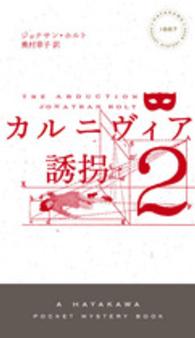- ホーム
- > 洋書
- > 英文書
- > Literary Criticism
Full Description
"If you inquire into the origins of the novel long enough," writes James Tatum in the preface to this work, "...you will come to the fourth century before our era and Xenophon's Education of Cyrus, or the Cyropaedia." The Cyrus in question is Cyrus the Great, the founder of the Persian empire celebrated in the Book of Ezra as the liberator of Israel, and the Cyropaedia, written to instruct future rulers by his example, became not only an inspiration to poets and novelists but a profoundly influential political work. With Alexander as its earliest student, and Elizabeth I of England one of its later pupils, it was the founding text for the tradition of "mirrors for princes" in the West, including Machiavelli's Prince. Xenophon's masterpiece has been overlooked in recent years: Tatum's goal is to make it fully meaningful for the twentieth-century reader. To accomplish this aim, he uses reception study, philological and historical criticism, and an intertextual and structural analysis of the narrative.
Engaging the fictional and the political in a single reading, he explains how the form of the work allowed Xenophon to transcend the limitations of historical writing, although in the end the historian's passion for truth forced him to subvert the work in a controversial epilogue. Originally published in 1989. The Princeton Legacy Library uses the latest print-on-demand technology to again make available previously out-of-print books from the distinguished backlist of Princeton University Press. These editions preserve the original texts of these important books while presenting them in durable paperback and hardcover editions. The goal of the Princeton Legacy Library is to vastly increase access to the rich scholarly heritage found in the thousands of books published by Princeton University Press since its founding in 1905.
Contents
*FrontMatter, pg. i*CONTENTS, pg. ix*ILLUSTRATIONS, pg. xi*PREFACE, pg. xiii*ACKNOWLEDGMENTS, pg. xvii*Chapter One. The Classic as Footnote, pg. 3*Chapter Two. The Rise of a Novel, pg. 36*Chapter Three. The Curious Return of Cambyses, pg. 75*Chapter Four. The Grandson of Astyages, pg. 97*Chapter Five. The Envy of Uncle Cyaxares, pg. 115*Chapter Six. Dialectical Imperialism: Tigranes and the Sophist of Armenia, pg. 134*Chapter Seven. In the Face of the Enemy: A Meeting with Croesus of Lydia, pg. 146*Chapter Eight. The Uses of Eros and the Hero, pg. 163*Chapter Nine. The Economy of Empire, pg. 189*Chapter Ten. Revision, pg. 215*NOTES, pg. 243*BIBLIOGRAPHY, pg. 277*INDEX, pg. 289*INDEX LOCORUM, pg. 295







